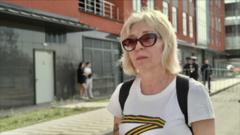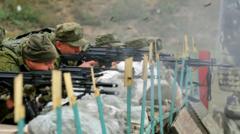This year, Russia celebrates its WWII victory, intertwining it with narratives about the war in Ukraine, evoking deep national sentiments.
**Rethinking Victory: Russia Commemorates 80 Years Since WWII Triumph Amid Ongoing Conflict**

**Rethinking Victory: Russia Commemorates 80 Years Since WWII Triumph Amid Ongoing Conflict**
As the 80th anniversary of WWII approaches, Russia reflects on history and current battles.
In a park just outside of Moscow, dramatic scenes evoke deep emotions as Ruscists impersonating Soviet soldiers reenact a significant WWII battle. Spectators safely watch the simulated storming of a bridge, which symbolizes the Soviet victory over Nazi Germany—a moment the nation still commemorates 80 years later. The historical re-enaction in Dubna is just one of many events marking the anniversary of this pivotal moment, known in Russia as The Great Victory.
Among the attendees at these events is Katya, whose family has been shaped by war across generations. Her grandfather, a soldier during WWII, went missing in action during the fight for Berlin. “He was declared dead in January 1945,” she explains. Echoing history, her son is currently enlisted in Ukraine's ongoing conflict, which she describes as a "special military operation." She expresses apprehension about his decision to fight, but acknowledges his unwavering resolve.
Russia's narrative around the war highlights a dual identity of both victor and victim. The Soviet Union endured staggering losses during WWII, with over 27 million citizens perishing in what is locally referred to as the Great Patriotic War. This legacy profoundly impacts the Russian psyche, as officials adopt the framed story of a continuous battle against fascism, suggesting that the present-day conflict in Ukraine echoes the past.
Media portrayals promote this notion, emphasizing that today’s struggle is merely an extension of WWII. "Victory still shapes Russian identity; it’s our common thread," states columnist Andrei Kolesnikov. However, the official narrative often neglects nuanced historical complexities, such as the earlier non-aggression pact between Stalin’s USSR and Hitler.
Recent television discussions have criticized international leaders, demonizing them through a WWII lens while neglecting historical context. In a symbolic move, a newly created monument in Khimki exemplifies the connection between past and present soldiers, depicting a WWII Red Army warrior alongside a modern-day soldier heading to Ukraine, serving as a stark reminder of ongoing grief and valor.
As Russia gears up for its grand Victory Day celebrations with military parades showcasing power and resilience, the juxtaposition of a past victory against the current war effort raises poignant questions. Despite claims of assured victory in Ukraine, the real situation remains complicated and unresolved more than a year into the conflict.
With this anniversary, many in Russia, including generations like 98-year-old Fyodor Melnikov, reflect not just on victory but the high price of war. Having lost his brother during the Great Patriotic War, he shares heartfelt poetry about remembrance and love amid loss. For many Russians, including Fyodor, this year’s commemoration represents both a celebration and a day of sorrow—reminding all of the profound human cost that war entails.
Among the attendees at these events is Katya, whose family has been shaped by war across generations. Her grandfather, a soldier during WWII, went missing in action during the fight for Berlin. “He was declared dead in January 1945,” she explains. Echoing history, her son is currently enlisted in Ukraine's ongoing conflict, which she describes as a "special military operation." She expresses apprehension about his decision to fight, but acknowledges his unwavering resolve.
Russia's narrative around the war highlights a dual identity of both victor and victim. The Soviet Union endured staggering losses during WWII, with over 27 million citizens perishing in what is locally referred to as the Great Patriotic War. This legacy profoundly impacts the Russian psyche, as officials adopt the framed story of a continuous battle against fascism, suggesting that the present-day conflict in Ukraine echoes the past.
Media portrayals promote this notion, emphasizing that today’s struggle is merely an extension of WWII. "Victory still shapes Russian identity; it’s our common thread," states columnist Andrei Kolesnikov. However, the official narrative often neglects nuanced historical complexities, such as the earlier non-aggression pact between Stalin’s USSR and Hitler.
Recent television discussions have criticized international leaders, demonizing them through a WWII lens while neglecting historical context. In a symbolic move, a newly created monument in Khimki exemplifies the connection between past and present soldiers, depicting a WWII Red Army warrior alongside a modern-day soldier heading to Ukraine, serving as a stark reminder of ongoing grief and valor.
As Russia gears up for its grand Victory Day celebrations with military parades showcasing power and resilience, the juxtaposition of a past victory against the current war effort raises poignant questions. Despite claims of assured victory in Ukraine, the real situation remains complicated and unresolved more than a year into the conflict.
With this anniversary, many in Russia, including generations like 98-year-old Fyodor Melnikov, reflect not just on victory but the high price of war. Having lost his brother during the Great Patriotic War, he shares heartfelt poetry about remembrance and love amid loss. For many Russians, including Fyodor, this year’s commemoration represents both a celebration and a day of sorrow—reminding all of the profound human cost that war entails.

















